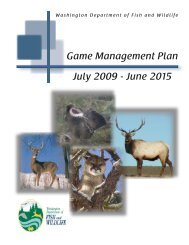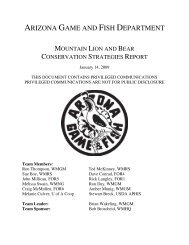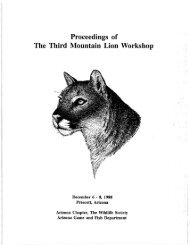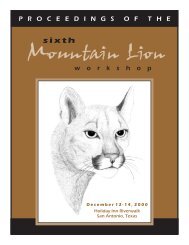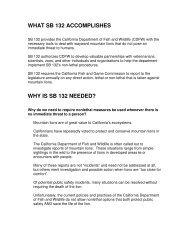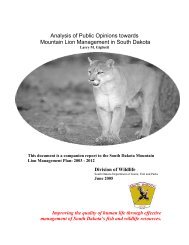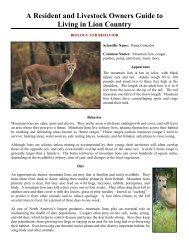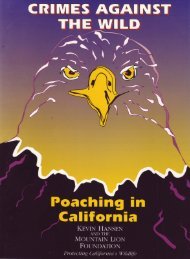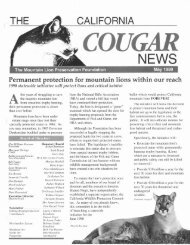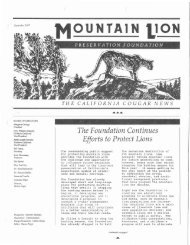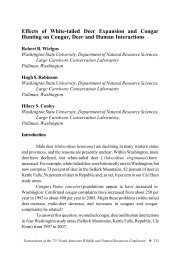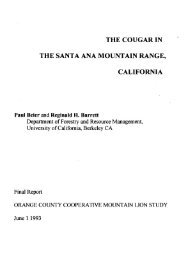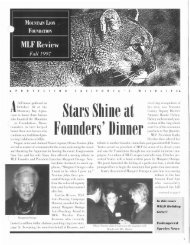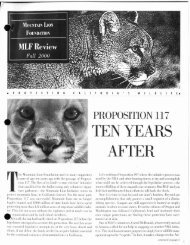Proceedings of the Ninth Mountain Lion Workshop - Carnivore ...
Proceedings of the Ninth Mountain Lion Workshop - Carnivore ...
Proceedings of the Ninth Mountain Lion Workshop - Carnivore ...
You also want an ePaper? Increase the reach of your titles
YUMPU automatically turns print PDFs into web optimized ePapers that Google loves.
9 th <strong>Mountain</strong> <strong>Lion</strong> <strong>Workshop</strong><br />
Panel Discussion Participants, Questions, and Response Summary<br />
Panelists:<br />
Howard Quigley, Executive Director, Craighead Beringia South<br />
Terry Mansfield, Deputy Director (retired), Idaho Department <strong>of</strong> Fish and Game<br />
Gary Power, Commissioner, Idaho Fish and Game<br />
Gary Koehler, Wildlife Research Scientist, Washington Department <strong>of</strong> Fish and Wildlife<br />
Steve Nadeau, Large <strong>Carnivore</strong> Manager, Idaho Department <strong>of</strong> Fish and Game<br />
Linda Sweanor, Interim President, Wild Felid Research and Management Association<br />
(WFA)<br />
Questions for Panel Discussion<br />
1) In <strong>the</strong> case <strong>of</strong> continued human urbanization and development in cougar habitat,<br />
how can cougar managers better integrate awareness on multiple planes…such as<br />
land-use planning entities, developers, and <strong>the</strong> general public?<br />
2) Where do we get <strong>the</strong> funding to accomplish long-term studies that have <strong>the</strong><br />
scientific robustness to affect management and answer our ecological questions?<br />
3) Is it worth considering development <strong>of</strong> multi-agency, multi-state approaches to deal<br />
with conflicting values, opinions and viewpoints that result in conflict-driven<br />
management? What educational approaches at state or regional levels might be<br />
considered?<br />
4) Given that harvest trends are remarkably consistent across <strong>the</strong> West, how do you<br />
explain <strong>the</strong> apparent disassociation with widely varying hunting season<br />
frameworks?<br />
5) Given <strong>the</strong> consistent trend in declining harvest in most western states, how will this<br />
influence future management and harvest opportunities?<br />
6) How can states standardize DNA collection to have regional, and even continental,<br />
application?<br />
7) Would it be best to have a central depository, or bank, for both disease and genetic<br />
information, and is <strong>the</strong> Wild Felid Association a good managing entity for this?<br />
8) If you want to reduce <strong>the</strong> cougar population in a management unit, can it be<br />
effectively done through established harvest limits, or does that just alter <strong>the</strong> age<br />
structure?<br />
9) What is <strong>the</strong> best method for integrating source-sink dynamics into cougar<br />
management plans that can stay “current” with annual population changes?<br />
10) Should cougar range expansion into new regions, such as <strong>the</strong> Mid-West, be<br />
encouraged or discouraged from a social acceptance standpoint? What is <strong>the</strong><br />
likelihood <strong>of</strong> <strong>the</strong>se dispersal trends (especially from <strong>the</strong> Black Hills) continuing,<br />
given changes in Western cougar populations? Given our experiences in <strong>the</strong><br />
West, what is <strong>the</strong> likelihood <strong>of</strong> cougar acceptance in <strong>the</strong> Mid-West?<br />
<strong>Proceedings</strong> <strong>of</strong> <strong>the</strong> <strong>Ninth</strong> <strong>Mountain</strong> <strong>Lion</strong> <strong>Workshop</strong><br />
196



